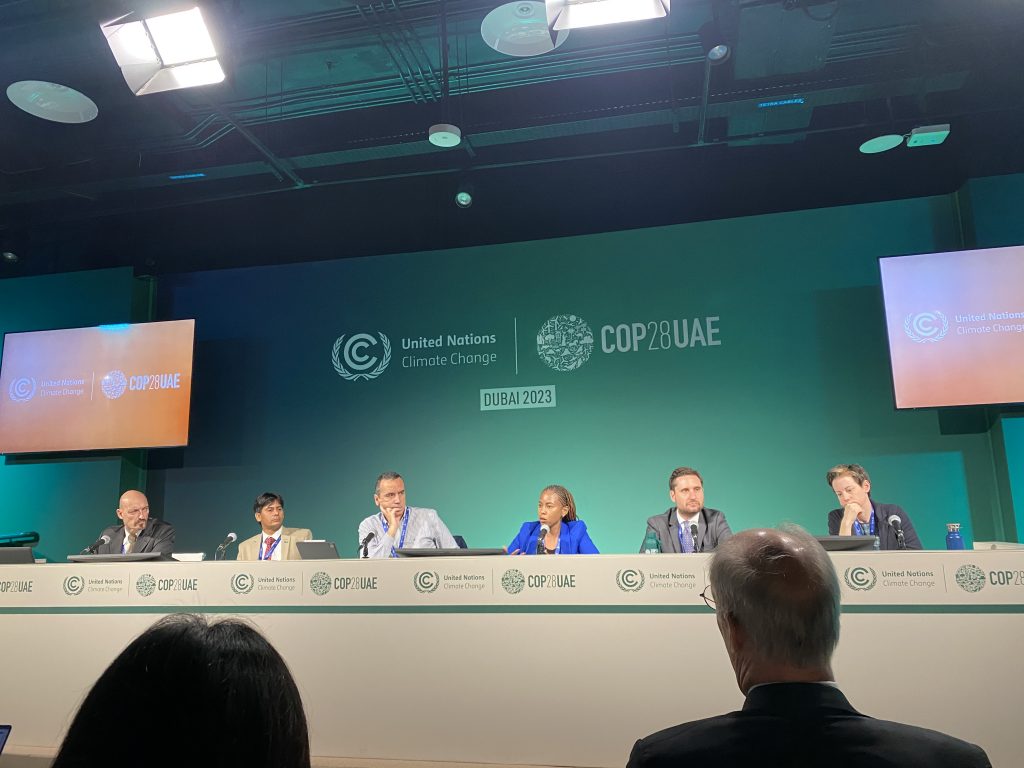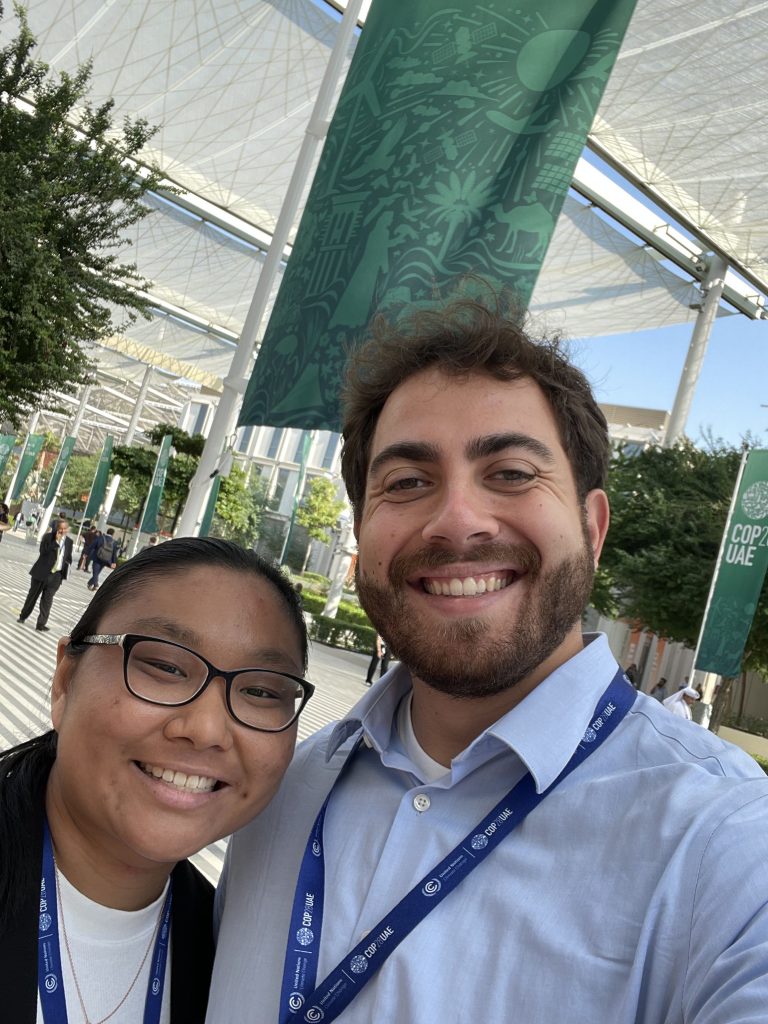By: Ethan Weiss ’25 (he/him) and Emmy Li ’25 (she/her)
Hi everyone! While we come to you rather late into the process of this year’s Conference of Parties, we would like to share our thoughts, reflections, and ideas as we wrap up week one of COP28 Dubai. For those that are not familiar with the UNFCCC and COP, we will do our best to explain! The United Nations Framework Convention on Climate Change operates as the international body upon which climate policies are negotiated and adopted. The Conference of Parties (COP) is an annual two-week convention where all representatives come to ‘finalize’ the year’s worth of smaller discussions into larger bodies of work. These smaller discussions occur in cities like Bonn, Germany, and New York City, USA, to build negotiations upon previous meetings, set agendas moving forward, and build slowly toward the culminating work that occurs at COP. While COP is the big summit of this work, it is not just an event. It is very much a process. Hannah’s post from earlier last week does a great job explaining this more!
This year, COP28 is characterized by a unique level of controversy due to its host nation. Dubai is a state (emirate) inside one of the UAE, one of the world’s largest oil exporting countries. Until very recently, the UAE’s economy has been based solely on its fossil fuel industry. Development as a world wonder and shifts in investment toward sustainable systems have backed the UAE’s aspirations to be a role model for climate action. That being said, they still export industry-leading amounts of oil with no plans to stop.
Days before the conference’s official start, the BBC released an investigative report outlining leaked memos that indicate the UAE’s intention of creating new oil deals during the COP’s proceedings. COP President Sultan al-Jaber had long faced criticism for his conflicts of interest as the head of a state-run oil company. A main agenda piece of COP is solidifying commitments to alternatives to fossil fuels and shifting toward a renewable future. If the leadership is entrenched in the industry that their conference seeks to absolve, how can they effectively fulfill their responsibility?
These thoughts remain at the forefront of our approach here in Dubai. Week One consisted of a mix of attending negotiation sessions, protests, and side events in a venue that seems to purposefully isolate these avenues of engagement. While the locations of these conversations are widely spread, the seemingly constant presence of fossil fuel private sector representatives trips our internal alarms. Save for the party-only negotiations and informal consultations, there have been executives, representatives, or lobbyists for pollutive industries at every single event we’ve attended. This ubiquity is not just anecdotal. The Associated Press counts a record-setting 1,300 oil representatives registered in attendance at this year’s COP. This is triple the number from last year at COP27 Sharm-el-Sheikh. Expo City’s blue zone layout includes one-hundred buildings, which breaks down to an average of thirteen representatives per location.
Hey everyone, Ethan here. My interests lay primarily within the realm of carbon markets. Such markets exist at different scales. Under the UNFCCC, Article 6.4 of the Paris Agreement addresses a forthcoming framework for an international carbon exchange scheme. There are also voluntary carbon markets (VCM), country- and state-specific compliance markets (Regional Greenhouse Gas Initiative (RGGI) and California Air Resources Board (CARB)), and union-level markets such as the EU’s Emissions Trading Scheme. Discussions over non-Article 6.4 matters have occurred at side events in the form of panel discussions. These panels on voluntary carbon markets have all had a mix of independent research leaders, institutional representatives, and our ever-present fossil fuel lobby. Their contributions (as our title suggests) are rooted in idealism that lacks substantive backing. An American oil executive was a panelist at the opening remarks for the thematic day on methane reductions where, upon first opportunity to speak, the conversation shifted to self-congratulatory remarks on their recognition of the need to abate methane emissions. Their commitments reduce methane, but not GHG emissions overall. Their comments are framed as “we should” or “we must” in reference to changing fossil fuel dependency. Their action smells distinctly of self-preservation.

Those that are on the side of creating offset solutions for voluntary carbon markets are at fault as well. One panel discussion, entitled “The Science Behind Carbon Markets,” was composed of two independent research representatives, a state environmental manager, and two forestry-based offset project firms. These two private-sector project developers spoke to the successes of their companies and the great potential of carbon sinking in creating forests. Items left unmentioned by any panelist were the fact that an estimated 80% of carbon offsets from forestry projects are either non-additional, reversed, or leaked to other areas. Pervasively low prices that do not reflect social costs of carbon were also omitted from the conversation. With the voluntary carbon market already under great duress from lack of confidence by investors, representing this topic with individuals from projects with arguably the least integrity is not only unhelpful, it’s embarrassing. Members from a previous panel spoke to the end-goal of uniting voluntary offset projects under a set of identified best-practices such that their contributions would be recognized by international regulatory markets. If this truly is the anticipated route, someone needs to tell these folks.
Hi! Emmy taking over! Looking beyond the carbon markets, panels directly engaging in discussions with private sector banking executives do not seem to offer any more hope either. These executives continue speaking to what should be done rather than what they are doing to fulfill these needs. In an event titled, “Accelerating Private Capital into Nature-based Solution Projects: a multi-stakeholder collaboration approach” in the Capacity Building Hub as part of Private Sector Finance Capacities Day, the speakers from various banks such as Barclays and HSBC came together to discuss how to channel more private capital funding into nature based solution (NbS for short) projects, specifically exploring the Mangrove Breakthrough Initiative created at COP27. However, once again, instead of explaining the process to de-risk the environment to encourage more private sector financing, the panelists focused more on highlighting how the current market into investing into NbS projects does not exist and will likely struggle to exist in the future as projects are not “bankable” in size, in addition to country scope issues. As I walked away from this panel, I was left with a more pessimistic view and one big question as to how to scale up private sector financing: if everyone thinks that private sector financing is supposed to facilitate early activity, where does talk stop being just talk?
We hope that as the conference moves into Week Two, more substantive answers will arise. Side events seem to take a back seat to the larger negotiations with the shortening timeline, though we will be keeping a keen eye on the contributions of private sector speakers around the conference. Perhaps their language will become more specific if the higher-level negotiations begin to settle on debates surrounding Paris Articles 6.2, 6.4, and 6.8. We look forward to keeping track of these discussions.
Till next time,
Ethan and Emmy
